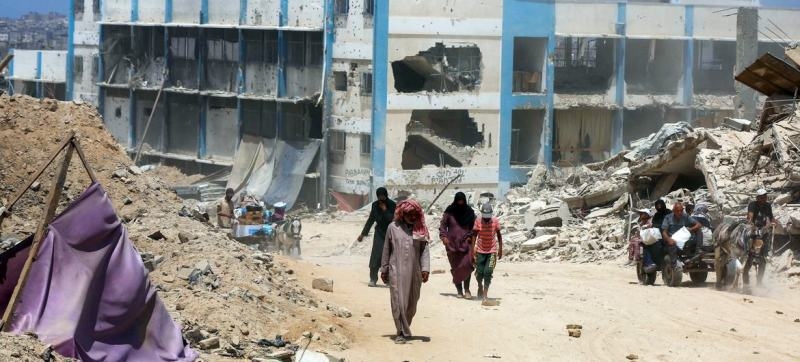- Youth participation vital to BD’s democratic future: C’wealth Group |
- Stocks retreat on week’s first trading day as turnover drops |
- Free education for girls up to honours if BNP wins: Zubaida Rahman |
- Dhaka ranks second worst in world for air pollution |
- Bangladesh stocks end week higher on upbeat mood |
UN warns of worse humanitarian disaster as ceasefire eludes Gaza

A school which had sheltered displaced people in Gaza stands in ruins. © UNRWA
19 August 2024 - UN Secretary-General António Guterres is closely following negotiations in Doha focused on trying to end the war in Gaza, where the situation continues to remain catastrophic after more than 10 months of unrelenting war.
The UN chief’s Spokesperson told journalists at the regular press briefing in New York on Monday that Mr. Guterres had spoken to the Prime Minister of Qatar yesterday.
“He was briefed on the state of the situation, and he will be staying in close touch and informed,” UN Spokesperson Stéphane Dujarric said.
The talks, backed by Egypt, Qatar and the United States, are expected to resume on Wednesday or Thursday in Cairo, following a two-day meeting involving the three nations and Israel in Doha last week.
“The Secretary-General very much hopes that all the parties involved will find the political courage, the political will to come to an agreement for the sake of the people of Gaza, for the sake of the people of Israel, for the sake of the hostages,” Mr. Dujarric added.
‘Catastrophic situation’
The already catastrophic situation in Gaza, is worsening amid repeated waves of displacement, combined with overcrowding, insecurity, crumbling infrastructure, active hostilities and limited services, the UN Spokesperson said.
Gaza has been under an intense Israeli military offensive since the brutal 7 October terror attacks by Hamas and other Palestinian armed groups on communities in southern Israel that left some 1,200 dead and more than 200 taken hostage.
As of August 9, 115 hostages remain captive, including some declared dead and whose remains are still in Gaza.
The onslaught has claimed the lives of over 40,000 Palestinians in the enclave, most of them women and children and injured more than 92,000, according to the Gazan health ministry. In addition, close to 90 per cent of the population has been displaced – many forced to move several times.
Population ‘increasingly concentrated’
“OCHA [the UN Office for the Coordination of Humanitarian Affairs] warns that the ongoing hostilities, constant evacuation orders, and severe shortages of essential supplies are making it increasingly difficult for displaced families to access basic services at their place of arrival,” Mr. Dujarric said.
He added that since October last year, 86 per cent of the Gaza Strip – about 314 square kilometres – has been placed under evacuation orders.
“As you may know, Gaza’s population is increasingly concentrated in a zone designated by Israeli authorities in Al Mawasi, where Palestinians have been told to go,” he said, noting that according to OCHA, the density of the area has surged to between 30,000 and 34,000 people per square kilometre, compared to an estimated 1,200 people prior to the war.
‘Severe’ fuel shortage
Severe shortages of fuel and medical supplies continue to disrupt the functionality of remaining hospitals and primary healthcare centres, particularly in northern Gaza, OCHA reported in a humanitarian bulletin on Monday.
It cited an announcement by the Director of the Al Awda Hospital in northern Gaza that all surgeries had been postponed and an appeal made for urgent fuel supplies to avert further deaths at the facility.
Conditions are equally critical at the Kamal Adwan Hospital, where fuel and medical supply shortages are reportedly threatening critical functions, OCHA noted, adding that the UN World Health Organization (WHO) and its partners were working on getting fuel to these facilities.
Furthermore, on Sunday, the Palestine Red Crescent Society (PRCS) warned that its ambulances, emergency medical clinics and relief services could grind to a halt in northern Gaza due to a lack of fuel. Its teams are already operating at minimum capacity and only two out of eight ambulances are operational, it added. - UNB

